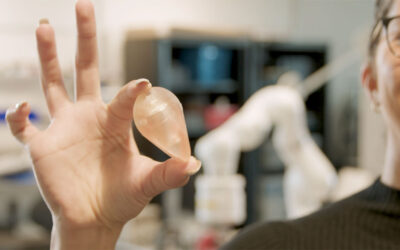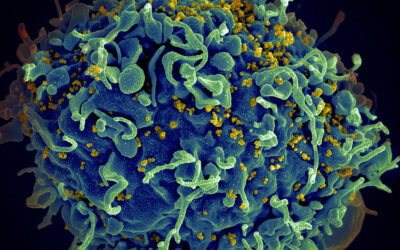A new study has found high levels of hormones called androgens alter the immune system in polycystic ovary syndrome (PCOS), a disorder characterized by irregular periods, ovarian cysts, and can lead to reproductive complications and serious metabolic disorders.
Given that approximately one in ten women of reproductive age suffer from polycystic ovarian syndrome, the fact that little is still known about how the disease works and affects the body on a fundamental level poses a significant burden on women’s health.
“These findings are of great importance as it is known that immune dysfunction is major component of reproductive complications, […] which are very common among women with [polycystic ovary syndrome],” said Sara Torstensson, a Ph.D. student at the Reproductive Endocrinology and Metabolism research group, and first author of the study published in Advanced Science.
Torstensson and her colleagues therefore investigated various immune cell populations in different tissues of the body, seeking out differences in those specifically involved in the immune system, reproduction, and metabolism in order to gain a deeper understanding.
This, she says, is because immune cells found in reproductive tissues are known to participate in reproductive processes related to ovulation, implantation, and placenta formation — processes that are negatively affected in women with polycystic ovary syndrome.
Additionally, these patients often suffer from insulin resistance and develop type 2 diabetes at a young age, processes the team suspects could be linked to the immune cells in a type of fat tissue that helps control metabolic processes.
“The study sheds light on immune dysfunction as a potential aspect of polycystic ovary syndrome pathology, which could constitute a novel target for therapies,” she said. “We are currently working to understand if androgens also affect the function of the immune cells and if this contributes to the reproductive complications and metabolic [conditions].”
The immune system and polycystic ovary syndrome
Little is known about how the immune system in women is affected by high levels of androgens, such as testosterone, typically found in women with polycystic ovary syndrome. At normal levels, androgens help maintain bone density, reproductive health, and overall wellbeing.
To simulate polycystic ovary syndrome symptoms, the team exposed female mice to high levels of androgen hormones and monitored them for several weeks.
According to Torstensson, one of the study’s most interesting findings was related to immune cells in fat tissue, called visceral adipose tissue, which is stored around internal organs in the abdomen. It is well-known that immune cells in adipose tissue are affected in obese individuals and contribute to insulin resistance and type-2 diabetes.
“[There were] clear alterations of immune cells in adipose tissue, despite an unaltered fat mass of the androgen-exposed mice,” said Torstensson. “The impact of androgens on immune cells in adipose tissue is very interesting considering the high prevalence of insulin resistance and type-2 diabetes among normal weight women with polycystic ovary syndrome.”
Interestingly, though clearly altered by androgens, some of the immune cells, such as eosinophils and NK cells, did not possess any handle, dubbed receptors, that would allow the androgens to directly interact with them.
Instead, any changes in their behavior are likely happening through other indirect, and currently unknown, ways. “Androgens play a broader and more complex role in modulating the immune environment than only through direct androgen receptor activation on immune cells,” said Elisabet Stener-Victorin at the Department of Physiology and Pharmacology at Karolinska Institutet and lead author of the study.
More insights came when the scientists looked at changes in reproductive tissues, particularly the ovaries. Here, they found fewer immune cells called macrophages, which normally help trigger ovulation, in PCOS-mice compared to healthy control mice.
“The decreased frequency of macrophages in the ovaries of PCOS-like mice is an intriguing finding,” stated the authors of the study. This observation is noteworthy as women with polycystic ovary syndrome often experience irregular ovulation, and is one of the diagnostic criteria for the disorder.
Paving the way for future treatment
This discovery marks the first identification of a possible link between affected immune cells and polycystic ovary syndrome, offering a valuable foundation for understanding the condition’s underlying mechanisms.
The team is hopeful that their detailed insights into immune alterations in various tissues related to polycystic ovary syndrome will pave the way for the development of better treatments for patients with the condition, as there are currently no curative options available.
“Polycystic ovary syndrome affects different tissues in unique ways. Potential treatments would need to be carefully tailored to target specific tissue dysfunctions,” said Stener-Victorin. “Our future research aims to deepen our understanding of the complex mechanisms involved and potentially lead to more effective and targeted therapies.”
Reference: Sara Torstensson, et. al., Androgens Modulate the Immune Profile in a Mouse Model of Polycystic Ovary Syndrome, Advanced Science (2024). DOI: 10.1002/advs.202401772
Feature image credit: Pawel Czerwinski on Unsplash

















